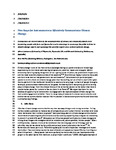Five steps for astronomers to communicate climate change effectively
Date
2021-09Author
Subject
Metadata
Show full item recordAbstract
Astronomers are trusted voices in the communication of science; our community should resist inundating people with facts and figures but use its advantage to encourage the public to listen to climate change experts and encourage the need for urgent cross-sectoral systemic change.
Climate change is one of the most serious challenges facing our planet and we are increasingly experiencing its dire effects with soaring temperatures, wildfires, floods and droughts. Within astronomy there is growing recognition of the urgency of the situation, the profession’s impact on it and the need to communicate outside the academy1,2,3. Scientists are highly trusted by the public and tend to be seen as independent and non-controversial4. Astronomers are particularly well placed to communicate on climate change, given that the exciting nature of their subject often provides them with a platform in the media and the ability to reach out to very large numbers of people through a variety of public outreach events around the globe. Astronomy offers many entry points to talking about climate change, from the climate history of the terrestrial planets to the notion that there is no alternative planet for humans to live on: there is no ‘Planet B’3. We argue that there is a real window of opportunity for astronomers to engage with the topic and weave climate change into their public engagement activities. There is a large body of research in science and environmental communication that can inform practice in the astronomy community and here we summarize the key findings.
Collections
Publisher
Journal
Volume
Issue
Pagination
Recommended, similar items
The following license files are associated with this item:


